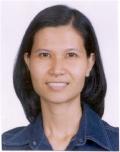The Independent Newsweekly
| National
Catholic Reporter
The Independent Newsweekly |
| Global Perspective |
| May 14, 2003 |
Vol.
1, No. 7
|

Gemma Tulud Cruz is a doctoral student in feminist theology at the University of Nijmegen, the Netherlands. She also is a lecturer of religion at the Assumption College in Manila, the Philippines. Her email address is serenity3_99@yahoo.com More information on the Venerable Dhammananda and bhikkhuni ordination can be found at www.Thaibhikkhunis.org
|
Bhikkhunis: Ordaining Buddhist WomenBy Gemma Tulud Cruz NIJMEGEN, The Netherlands -- In an inconspicuous Buddhist temple, Wat Songdhammakalyani, in a distant suburb southwest of Bangkok, extraordinary things are happening. Wat Kalyani (as it is known) is a center for bhikkhunis ("female monks" as the Thais translate it) in the Theravada Buddhist tradition. In a country of 60 million, more than 90% of whom are Theravada Buddhists, there are some 300,000 bhikkhus or male monks and 25,000 temples where men can learn about and practice Buddhist Dharma. But only a handful of temples have focused attention on women, and there is only one bhikkuni, the Venerable Bhikkhuni Dhammananda of Wat Kalyani who was ordained on Feb. 28. She had to be ordained in Colombo, Sri Lanka, because Thai law prohibits the ordination of women. The bhikkhuni sangha (female monks' community) disappeared from the Theravada traditions around the 11th or 13th century C.E. Thus when Buddhists in Sri Lanka restored the bhikkhuni sangha in 1996, the first ordinations had to be conducted with the help of Korean and Taiwanese bhikkhunis, who belong to the Mahayana Buddhist tradition. Since then, more than 200 women, including some from other countries, have been ordained in Sri Lanka. As a bhikkhuni, Dhammananda dons the saffron robe. This contrasts with white-robed, non-ordained women renunciants known as nuns or mae chees in Thai. The mae chees have traditionally been regarded as uneducated and serve as unpaid consecrated servants and maids of the bhikkhus. This distinction from the mae chees has put Dhammananda in the center of much dispute. She has been labeled as an impostor, received nasty letters and hateful criticisms from many monks, and was even subjected to a government investigation, an obvious case of harassment. She has, however, also received support from a number of senior monks, including one who sent an e-mail to Sri Lanka offering his blessings for her ordination. She says, "They told me to persevere, to prove myself to society. If society embraces the new institution, the clergy will have to accept it too, because the clergy is also supported by society." Dhammananda insists she never meant to antagonize the monks: "We are not asking for anything; we are not demanding any privileges; we don't want to be confrontative." But she adds, "On the other hand, it is our duty to bring back the bhikkhuni sangha. Bhikkhuni ordination is a right which the Buddha gave women." That the Thai Supreme Sangha Council of the bhikkhus has not made any official comment on Dhammananda's ordination is significant. Dhammananda is well versed in the issue. In her "previous life," as Dr. Chatsumarn Kabilsingh, a professor of religion and philosophy at Thailand's prestigious Thammasat University, she researched the bhikkhuni sangha extensively. Her research convinced her that the Buddha, who lived more than 2,500 years ago, was probably the world's first feminist. He believed that men and women are equally potentiated for spiritual enlightenment. Dhammananda proclaims: "I became a feminist because I am a Buddhist." She also has been president of Sakyadhita International, a Buddhist women's organization, a member of the International Peace Council and an advisor to the Inter-Religious Federation for World Peace. She has been featured on CNN, the BBC and is the subject of a National Geographic Society film. Dhammananda is proving herself, not so much by words but by deeds. Wat Kalyani hosts numerous training programs for women and girls, and is a shelter for underprivileged women. She says her new-found mission is to "teach wholesome lifestyles." She says, "In academia, I provided food only for the brain, but now as a Dharma teacher, the food I provide is for the well-being of the heart. "My audience has also changed; I no longer speak to only students and intellectuals. Now in my lectures I meet farmers, hawkers, housewives, businessmen, and many uneducated people." The vivacious 50-something obviously cultivates patience and loving kindness (Her bhikkhuni name means "joyfulness."), even among those who might hinder her religious duty. One witnesses this also in the chi-qung, yoga, pottery, and soap and fruit carving exercises she incorporates into her women's training programs, as well as in the lotus pond and dharma garden in her temple compound. Dhammananda's ordination not only marks a new chapter in Buddhism in Thailand, it is also a testament to the triumph of the human spirit, more specifically, woman spirit. When I met and spoke with her in Wat Kalyani, a phrase kept ringing in my head: "in the presence of grace." She is a witness to the Ultimate Reality that Buddhists and Christians, women and men -- anyone and everyone who believes in the "fullness of life" that all religions are supposed to bring -- should heed and emulate. As a Catholic and a feminist, I am left to ponder: Might Dhammananda's life and mission be a source of hope and inspiration for our church's mission of developing women's ministry? Might her spirit of loving kindness not inspire our own feminist liberationists' attitudes and struggle? |
| Copyright
© 2003 The National Catholic Reporter Publishing Company, 115
E. Armour Blvd., Kansas City, MO 64111
TEL: 1-816-531-0538 FAX: 1-816-968-2280 |